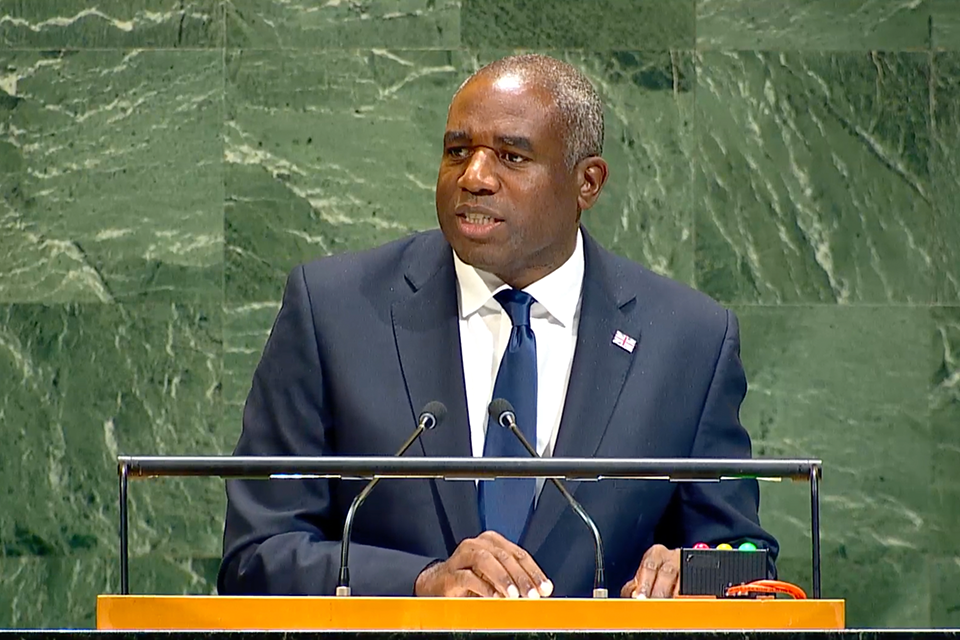-
New National Commission will help accelerate safe access to AI in healthcare and across the NHS by advising on new regulatory rulebook – set to be published next year
-
With expertise from global AI leaders, clinicians and regulators, the Commission will immediately review tech that’s being held back by regulatory uncertainty, like AI assistants for doctors
-
It follows new tech being trialled to speed up discharges and let GPs focus on patients instead of taking notes, as tech plays central part in transforming the NHS under the Plan for Change
The NHS should get quicker access to the latest AI tools, thanks to a new National Commission that has been tasked with advising the Medicines and Healthcare products Regulatory Agency (MHRA) on how to re-write the regulatory rulebook on AI in healthcare, which will be published next year.
The UK National Commission on the Regulation of AI in Healthcare will bring in experts from big tech companies – like Google and Microsoft – as well as leading clinicians, researchers and patient advocates, to advise regulators on how to speed up access to the latest tech in a safe way, so British patients can safely benefit from it first.
In the meantime, the Commission will also look at accelerating access to AI assistants for doctors that help by taking notes, with regulatory uncertainty currently holding the tech back. Early tests of ‘Ambient Voice Technology’ shows that it has reduced admin to mean that more people could be seen in A&E and clinicians could spend more time focusing on patients.
The Commission will also help by providing regulatory clarity on various AI tools such as those for radiology and pathology, and remote monitoring systems to support virtual care of patients from their own homes – alerting staff to early signs of deterioration while helping people live independently.
As well as helping British patients feel the benefit of new technology first, by providing regulatory clarity for new AI tools this approach will attract technology companies to invest in developing and using their latest innovations in the UK, driving forward the government’s plan to build an NHS fit for the future as part of the Plan for Change.
Science and Technology Secretary Liz Kendall said
“AI has incredible potential to help doctors spot and treat diseases earlier. But we need experts to come together so patients can benefit from these opportunities quickly and safely.
“This Commission will ensure the UK leads the way in making these game-changing technologies available in the safest possible way, helping more of us to lead healthy, longer lives and supporting our NHS.”
Health Innovation Minister, Zubir Ahmed, said
“AI has the potential to transform healthcare, but only if we get the regulation right. This Commission will ensure we harness the power of artificial intelligence to save lives and improve care, whilst maintaining the highest safety standards our patients deserve.
“By bringing together the brightest minds in healthcare, technology and patient safety, our Plan for Change is positioning the UK as the global leader in AI-enabled healthcare. This isn’t just about innovation for innovation’s sake – it’s about building an NHS that works better for patients, catches diseases earlier, and gives our incredible NHS staff the tools they need to provide world-class care.”
The Commission, which will be chaired by Professor Alastair Denniston, practising NHS clinician and head of the UK’s Centre of Excellence in Regulatory Science in AI & Digital Health (CERSI-AI), and deputy chaired by the Patient Safety Commissioner Professor Henrietta Hughes, will guide the MHRA on how cutting-edge AI technologies can be safely and effectively integrated into everyday healthcare.
Lawrence Tallon, Chief Executive of the MHRA, said
“We want regulation of AI in healthcare to move at the pace of innovation. AI has enormous potential to transform patient outcomes, improving quality, access and equity of care while driving efficiency.
“It is crucial that AI regulation maintains patient safety and public confidence. By bringing together leading voices in healthcare, technology, and patient safety, this Commission will help establish the UK as a global leader in responsible AI healthcare regulation.
“The MHRA will act on the recommendations of the Commission to support the NHS’s digital transformation and advance the UK’s ambition to become a global hub for health tech investment”.
Professor Alastair Denniston, Commission Chair, said
“I’m honoured to be appointed Chair of the UK National Commission on the Regulation of AI in Healthcare. The safe and effective use of AI in healthcare is one of the defining challenges – and opportunities – of our time.
“This Commission marks a vital step in ensuring the UK leads the way in responsible innovation, and in accelerating the availability of AI technologies that can support better health for everyone. By bringing together diverse expertise we can build a regulatory framework for AI that is trusted by the public and health professionals, and delivers real benefits for patients.”
Professor Henrietta Hughes, Patient Safety Commissioner and Commission Deputy Chair, said
“It’s a great honour to be appointed as Commission Deputy Chair. AI in healthcare has the potential to bring huge benefits for patients, but it must be carefully regulated. In developing the use of AI in healthcare we must listen to patients’ views to ensure that its use is safe and equitable.”
Dame Jennifer Dixon, CEO of the Health Foundation, said
“The Health Foundation is delighted to be collaborating on the new Commission for the Regulation of AI in Healthcare. AI is advancing rapidly in healthcare, with growing evidence of its potential to enhance care delivery, improve outcomes and productivity, and enrich patient experience.
“While the NHS 10-Year Plan set a bold vision for AI, regulation must keep pace with innovation and facilitate effective use and spread. A robust and ethical framework is essential to maintain momentum, build trust in the technology among staff and patients and ensure the UK remains a leader in responsible AI in healthcare.”
AI has the potential to revolutionise health and social care, but it presents new challenges for regulators. Unlike pills and hardware devices, more factors can affect the performance of an AI system over time and in different patient groups. A review of existing and creation of a new framework is therefore needed to make sure revolutionary AI technology can be introduced to the NHS rapidly, in a safe, effective and reliable way.
Supported by the Health Foundation as a research partner, the Commission will help shape this new rulebook, which will be published next year. This will help enable key commitments in the government’s 10-Year Health Plan for England and Life Sciences Sector Plan to transform the NHS for the benefit of patients, and drive economic growth in the UK’s life sciences sector.
AI is already being used to analyse and interpret acute stroke brain scans to support doctors when diagnosing and making treatment decisions in 100% of stroke units in England. Thanks to the AI Diagnostic Fund, 50% of hospital trusts are now deploying AI to help diagnose conditions like lung cancer. Separate research has indicated that hospitals using AI-supported diagnostics have seen a 42% reduction in diagnostic errors.
The National Commission’s work will directly support the NHS’s digital transformation for the benefit of patients, and the UK’s ambition to become a global hub for health tech investment
Representatives, including other regulatory bodies, from across the healthcare ecosystem in the UK and internationally, will have voices in the AI National Commission, ensuring advice balances innovation with patient safety.
To ensure the National Commission’s work reflects the full breadth of perspectives, a formal call for evidence will be launched following the initial announcement. This will invite contributions from across the UK and internationally, helping to shape the Commission’s recommendations and address the most pressing challenges in AI regulation. Further details will be shared in the coming weeks.
Notes to editors
-
The MHRA enhances and improves the health of millions of people every day through the effective regulation of medicines and medical devices, underpinned by science and research.
-
The National Commission on the Regulation of AI in Healthcare is an expert, non-statutory advisory body established by the MHRA to review current regulations and provide recommendations for a new regulatory framework for AI in healthcare. The membership of the Commission is
Professor Alastair Denniston, Professor of Regulatory Science and Innovation at the University of Birmingham, Honorary Consultant Ophthalmologist at University Hospitals Birmingham NHS Foundation Trust and Executive Director of the UK’s Centre of Excellence for Regulatory Science in AI & Digital HealthTech (CERSI-AI)
Professor Henrietta Hughes, Patient Safety Commissioner
Dame Jennifer Dixon, Chief Executive of the Health Foundation
Dr Ricardo Baptista Leite, CEO, HealthAI – The Global Agency for Responsible AI in Health
Dr Brian Anderson, CEO of Coalition for Health AI (CHAI)
Richard Stubbs, Chief Executive of Health Innovation Yorkshire & Humber
Professor Neil Lawrence, DeepMind Professor of Machine Learning at the University of Cambridge and Chief Scientist at Trent AI
Professor Cathie Sudlow, Head of School of Population Health Sciences, Director of Usher Institute, University of Edinburgh, Director, UKRI Adolescent Health Study, Director of Generation Scotland
Dr Vish Ratnasuriya MBE, practising GP, Chair of Our Health Partnership, co-founder of Primary Care Accelerator and Hon Assoc Professor University of Birmingham
Dr Gabriella Spinelli, Director of RADIANT-CERSI Centre for Regulatory Science & Innovation in Digital Health & Healthcare AI, Brunel University of London
Richard Susskind CBE KC, President of the Society for Computers and Law
Dr Barry Stein, Chief Clinical Innovation Officer, Chief Medical Informatics Officer, Founder of the Center for AI Innovation in Healthcare, Attending Vascular and Interventional Radiologist, Hartford HealthCare
-
Any further members will be added to the list on our website in due course
-
The Commission will be supported by specialist working groups with deep domain expertise and will receive secretarial and logistical support from the MHRA To will shape a new regulatory rulebook for AI in healthcare, to be published in 2026.
-
The MHRA is responsible for regulating all medicines and medical devices in the UK by ensuring they work and are acceptably safe. All our work is underpinned by robust and fact-based judgements to ensure that the benefits justify any risks.
-
The MHRA is an executive agency of the Department of Health and Social Care.
-
For media enquiries, please contact the [email protected], or call on 020 3080 7651.
Quotes from core Commission members
Professor Neil Lawrence, DeepMind Professor of Machine Learning at the University of Cambridge and Chief Scientist at Trent AI, said
“As AI takes an ever-growing role in healthcare, the formation of this Commission could not have come at a more important time.
“I look forward to working alongside the impressive array of experts on the Commission to advise on a new regulatory framework which will ultimately help NHS patients get quicker access to safe cutting-edge tech.”
Dr Ricardo Baptista Leite, CEO, HealthAI – The Global Agency for Responsible AI in Health said
“It is a privilege to contribute with the perspective of HealthAI as a member of the core commission on the regulation of AI in Health. I look forward to working alongside distinguished colleagues from across healthcare and technology sectors. “Together, we will work towards delivering governance and regulatory pathways to accelerate the adoption and scalability of safe and effective AI technologies that can contribute to improving health outcomes across the entirety of the United Kingdom.”
Dr Gabriella Spinelli, Director of RADIANT-CERSI Centre for Regulatory Science & Innovation in Digital Health & Healthcare AI, Brunel University of London said
“The establishment of this Commission marks an important step towards ensuring AI in healthcare is safe, trusted, and effective in real-world settings. It will contribute to better patient outcomes, improved productivity across the NHS, and growth in the UK’s software and AI as medical devices sector.”
Dr Vish Ratnasuriya MBE, practising GP, Chair of Our Health Partnership, co-founder of Primary Care Accelerator, and Honorary Associate Professor at the University of Birmingham, said
“Working on the frontlines of general practice and leading a Primary Care Accelerator, I see every day the potential benefits AI can bring to patients and populations. However we need thoughtful discourse to ensure that safety, effectiveness, and quality of patient experience are balanced with the drive to innovate at pace, and improve efficiency and outcomes that matter to people. “I’m pleased the Commission is focusing on the areas of greatest regulatory uncertainty, so that our national values of social justice and equity are upheld as we develop the NHS into the world’s leading AI-enabled health system.”
Brian Anderson, CEO of the Coalition for Health AI (CHAI), a collaborative organisation working to advance the responsible adoption of AI in healthcare, said
“I am honoured to join the National Commission announced today, an important forum that will help ensure that AI advances in ways that strengthen patient care, maintain public confidence, and align with the highest levels of safety and accountability. “The US and the UK have a strong track record of collaboration and I welcome the opportunity to bring the voice of the private sector – reflecting the perspectives of health systems, startups, innovators, and technology partners – to inform the Commission’s work in developing clear, practical, and globally relevant AI standards in healthcare.”
Professor Cathie Sudlow, Director of the Usher Institute at the University of Edinburgh and Director of the UKRI Adolescent Health Study and Generation Scotland, said
“It is a privilege to be contributing to this MHRA-led Commission. To fully realise the benefits of AI in healthcare, we need novel approaches that will enable agile, transparent and trustworthy regulation of AI products. I look forward to bringing to the Commission my expertise in the UK’s rich health data assets, which will continue to underpin innovation in AI and to play a key role in its regulation.”
Richard Stubbs, Chief Executive of Health Innovation Yorkshire & Humber, said
“AI has the power to revolutionise healthcare. It is vital that regulation keeps pace with technology, enabling safe, equitable, and impactful innovation for patients and the NHS alike. Ultimately, we will only experience the benefits that AI can bring if there is trust and confidence from citizens and healthcare professionals that tech is safe to use and beneficial to health outcomes.”
Dr. Barry Stein, Chief Clinical Innovation Officer, Chief Medical Informatics Officer, Founder of the Center for AI Innovation in Healthcare, Attending Vascular and Interventional Radiologist, Hartford HealthCare, Connecticut, USA, said
“It is a tremendous honour to participate alongside such esteemed colleagues, as a core member of the United Kingdom’s National AI Commission, representing Hartford HealthCare’s Center for AI Innovation in Healthcare. Unlocking the full potential of AI for healthcare is our collective objective and developing a framework to do so in a safe, secure and trustworthy way is our shared responsibility. We at Hartford HealthCare are thrilled to join this panel and contribute to shaping a strong foundation for global impact—advancing healthcare for all.”







